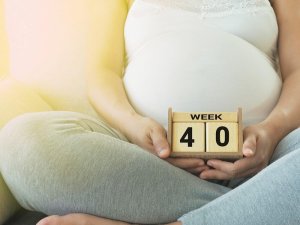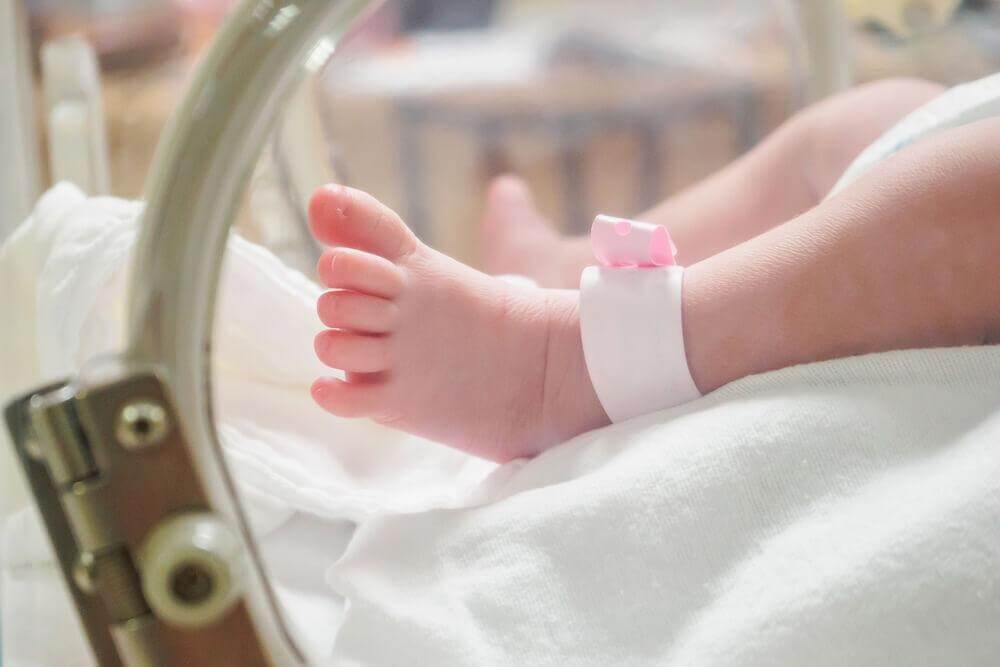The Risks of Pregnancy After Age 40

There are women in their forties who are about to have their first child. Although the chances of becoming pregnant are low, it’s important to know the risks of pregnancy after age 40.
Women tend to plan their pregnancies between their twenties and thirties. However, due to employment, economic, or personal reasons, delayed childbearing is quite common nowadays.
The Main Risks of Pregnancy After Age 40
Higher Risk of Genetic Abnormalities

When women age, their eggs no longer have the ability to divide themselves that easily. This is why there is an increased risk of genetic problems in infants. The most common one is Down syndrome.
This condition is caused by an error in cell division that begins with the formation of the egg or sperm. As a result, the embryo acquires an additional twenty-third chromosome. This syndrome causes mental retardation and severe heart disease.
When expectant mothers are under forty, the incidence rate of these conditions is lower than one in a thousand women. For those who are over forty, the risk rises to one in five hundred.
We recommend that you read: The Linea Nigra: a Reflection of Pregnancy
Preeclampsia
It’s a medical complication associated with hypertension and a lot of protein in the urine. If the condition arises, it begins after 20 weeks of pregnancy. The woman’s hands and face swell up, and this may damage the nervous system and cause seizures, strokes, and other conditions.
Hypertension
High blood pressure affects the baby. Most of the time, this problem occurs late in the second trimester. If symptoms recur, this may induce labor.
Risks During the Process
Infertility

Sometimes infertility is caused by physical or hormonal problems, sudden and drastic lifestyle changes, and environmental factors.
However, the most recurrent problem is premature ovarian failure, where the ovaries stop working before menopause. Another reason is polycystic ovary syndrome, which hinders the release of mature eggs.
Other conditions that contribute to infertility include tumors in the uterus, endometriosis, and blocked fallopian tubes.
Gestational Diabetes
It’s defined as a metabolic disorder during pregnancy. The most serious consequences are urinary tract infections, weight gain, and premature delivery.
Problems During Pregnancy
As mentioned above, women over forty are more likely to develop gestational diabetes and high blood pressure. In addition, there is a higher risk of damage to the placenta and they’re more likely to suffer abnormal bleeding during childbirth (or even before).
See also: Is it Possible to Get Pregnant Naturally at 45?
Risks During Childbirth
Premature Delivery

The greatest risk is the death of the baby, but the baby could also suffer many consequences if they survive, like deafness, blindness, or cerebral palsy.
Caesarean Section or Assisted Vaginal Delivery
In the case of delayed childbearing, the second stage of pregnancy is prolonged, therefore vaginal births require aggressive tools (vacuum or forceps) that result in a Caesarean section.
Miscarriage
This risk is characterized by the spontaneous death and expulsion of the fetus before its five months old. According to a Tambre Clinic study, from the ages of 20 to 24, the risk is 11%; from the ages of 25 to 29, the risk increases to 12%; and from the ages of 30 to 34, the risk increases to 15%.
However, the risk increases significantly to 25% after the age of 35 and it reaches almost 95% after the age of 40. Women who get pregnant after 40 don’t always suffer from these complications.
You never know for sure what risks you’ll face. Being a mother has never been easy, but its worth trying to have a child when the woman is ready and able to provide the baby stability.
All cited sources were thoroughly reviewed by our team to ensure their quality, reliability, currency, and validity. The bibliography of this article was considered reliable and of academic or scientific accuracy.
- Escandón Montenegro, M. A. (2016). Factores de riesgo materno/fetales en mujeres embarazadas mayores de 40 años atendidas en el Hospital Gineco-Obstétrico Enrique C. Sotomayor en el periodo de junio del 2015 a marzo del 2016(Doctoral dissertation, Universidad de Guayaquil. Facultad de Ciencias Médicas. Carrera de Obstetricia). http://repositorio.ug.edu.ec/bitstream/redug/48117/1/CD%20317-%20ESCANDON%20MONTENEGRO%20MARJORIE%20ALEXANDRA.pdf
- Dietl, A., Cupisti, S., Beckmann, M. W., Schwab, M., & Zollner, U. (2015). Pregnancy and obstetrical outcomes in women over 40 years of age. Geburtshilfe und Frauenheilkunde, 75(08), 827-832. https://www.ncbi.nlm.nih.gov/pmc/articles/PMC4554509/
- OWH. (2012). Infertility fact sheet. Office of Women Health. https://espanol.womenshealth.gov/a-z-topics/infertility
- Arizmendi, J., Pertuz, V. C., Colmenares, A., Hoyos, D. G., & Palomo, T. (2012). Diabetes gestacional y complicaciones neonatales. Revista Med de la Facultad de Medicina, 20(2), 4. https://dialnet.unirioja.es/servlet/articulo?codigo=5326881
- Egan, L. A. V., Gutiérrez, A. K. C., Cuevas, M. P., & Lucio, J. R. (2008). Perfil epidemiológico del parto prematuro. Ginecología y Obstetricia de México, 76(09), 542-548. https://www.medigraphic.com/pdfs/ginobsmex/gom-2008/gom089h.pdf
- Mayo Clinic Staff. (2016). Miscarriage. Mayo Clinic. https://www.mayoclinic.org/diseases-conditions/pregnancy-loss-miscarriage/symptoms-causes/syc-20354298
This text is provided for informational purposes only and does not replace consultation with a professional. If in doubt, consult your specialist.








